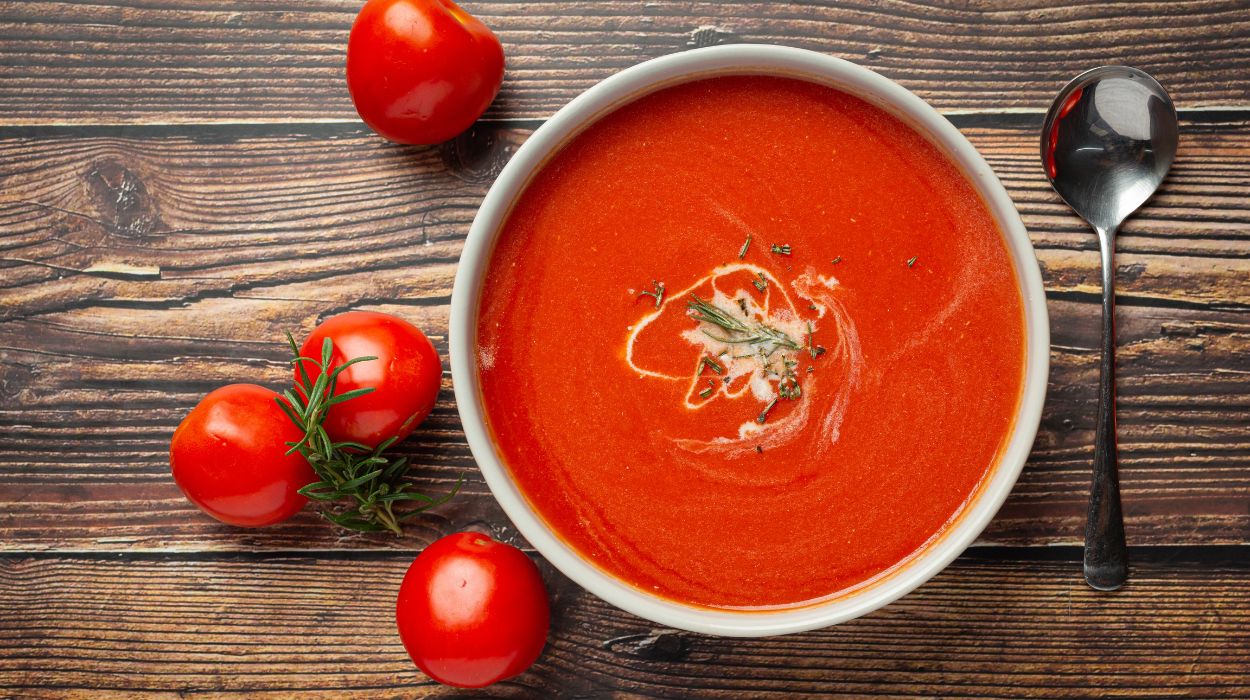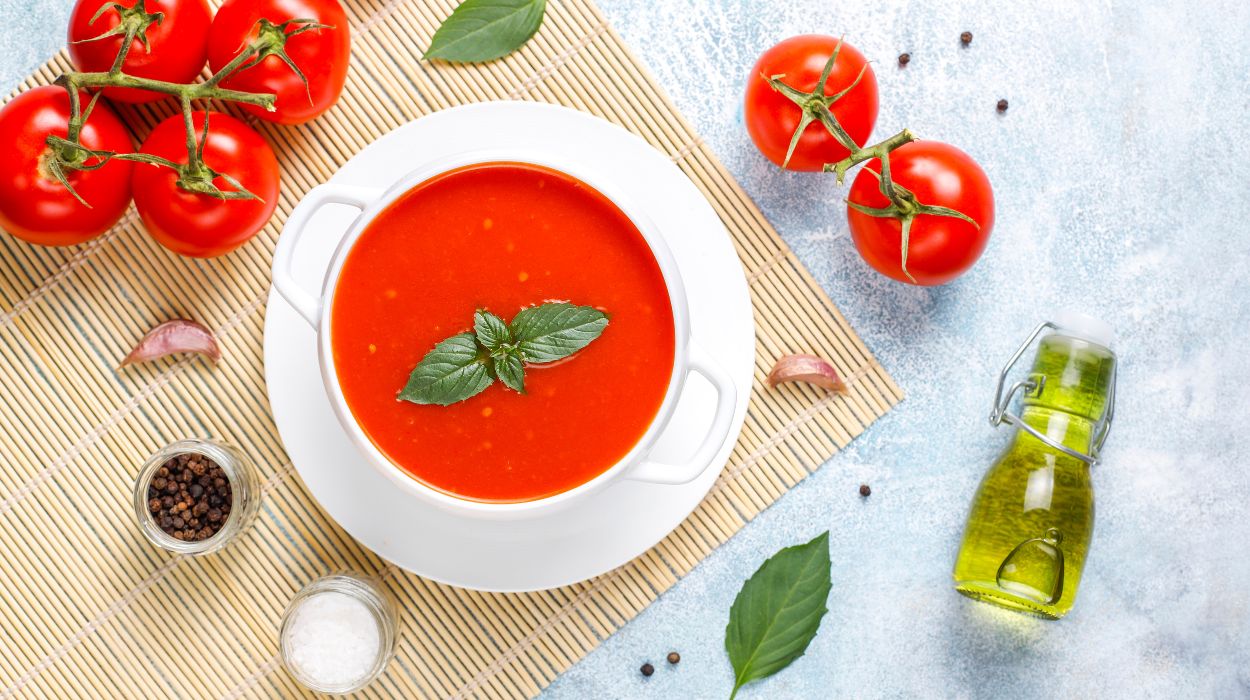 Expert's opinion
Expert's opinion
Expert's opinion
The article is a subjective view on this topic written by writers specializing in medical writing.
It may reflect on a personal journey surrounding struggles with an illness or medical condition, involve product comparisons, diet considerations, or other health-related opinions.
Although the view is entirely that of the writer, it is based on academic experiences and scientific research they have conducted; it is fact-checked by a team of degreed medical experts, and validated by sources attached to the article.
The numbers in parenthesis (1,2,3) will take you to clickable links to related scientific papers.
Is Tomato Soup Good For You? Here’s What Nutritionists Say In 2024

Have you ever tried a comforting bowl of tomato soup? This classic dish is renowned for its rich, tangy taste and velvety texture. Its popularity has led to countless recipes, ranging from simple, traditional versions to those with unique twists.
As one of the most beloved soups worldwide, tomato soup has become a staple in many households. But despite its widespread appeal and delicious taste, many people wonder if it is good for them or if it is just another comfort food without any real health benefits. Does it also have any hidden adverse effects on health?
In this article, we will delve into the nutritional aspects of tomato soup, discussing tomato benefits and drawbacks and ultimately answering the question: “Is tomato soup good for you?”
Is Tomato Soup Good For You?
Yes, tomato soup is healthy and good for you. The meal contains vitamin C, minerals, and other antioxidants like lycopene that have numerous benefits ranging from an improved immune system to better vision.
Nutritional Value Of Tomato Soup
Tomato soup contains many essential nutrients ranging from vitamins, minerals, and antioxidants. A 100-gram serving of raw tomato has 18 calories. It also has the following nutritional value:[1]
- Water – 94.2 grams
- Energy – 18 kilocalories
- Protein – 0.88 grams
- Fat – 0.2 grams
- Carbohydrate – 3.89 grams
- Fiber – 1.2 grams
- Calcium – 10 milligrams
- Iron – 0.27 milligrams
- Vitamin C – 13.7 milligrams
Tomatoes also contain vitamins A, E, K, and carotene. They also confer numerous health benefits.
Health Benefits Of Tomato Soup

The question can be answered by learning about the numerous benefits of tomato vegetables themselves. Here are some health benefits[2] of tomato soup:
Rich In Antioxidants
Tomatoes have a very high nutrient profile. They are an excellent source of antioxidants, such as lycopene, vitamin C, and beta-carotene. Antioxidants neutralize harmful free radicals[3] in the body, which can cause cell damage and inflammation.
One major driver of the antioxidant benefits is lycopene. It is a powerful antioxidant[4] that gives tomatoes their red color. It has been shown to reduce the risk of heart disease, cancer, and diabetes.[5]
Immune System Support
Tomato soup is a staple home remedy for the common cold. And that is based on the fact that it improves the immune system and allows the body to fight against the illness.
Vitamin C[6] is the tomato’s anti-oxidant that protects the body against various infections and diseases. The high vitamin C content in tomatoes helps boost the immune system, making it more effective in fighting infections and protecting the body from diseases.
Beta-carotene is another constituent that plays a role in immunity. It is a precursor to vitamin A–another vitamin vital in maintaining healthy skin and mucous membranes. Eventually, they act as a barrier against harmful pathogens.
Improved Heart Health
Another way tomato soup confers its benefit is through the cardiovascular system. According to research, lycopene[7] and vitamin C in it have been shown to reduce low-density lipoprotein (bad) cholesterol levels and prevent the oxidation of LDL cholesterol. This process can lead to plaque buildup in the arteries and increase the risk of heart disease.[8]
A research study of 82 participants in 2018 analyzed the cardiovascular properties of tomatoes[9] in patients with arterial hypertension. There was an addition of standardized tomato extract or STE to standard antihypertensive therapy for four weeks. At the end of the study, the participants showed improved blood pressure control.
Supports Bone Health
Tomato soup supports bone health in several ways, thanks to the presence of certain key nutrients essential for maintaining healthy bones. For example, tomato soup contains calcium, essential for building and maintaining strong bones.[10] Adequate calcium intake prevents osteoporosis.
Lycopene is also a star player in terms of bone health. Studies have shown that lycopene increases bone mineral density[11] in postmenopausal women–a characteristic symptom of osteoporosis. In the research, tomato intake resulted in a greater bone alkaline phosphatase reduction.
Promotes Skin Health
Here is a benefit you probably did not expect. Tomato soup has been linked to improved skin protection from UV rays.[12] Firstly, the high water content in it can help to keep your skin hydrated. Next, proinflammatory cytokines are also reduced, thus decreasing the chance of rashes. The result is healthy skin, free from UV damage, and well-hydrated.
Improved Vision
Our sense of sight also needs maintenance. The beta-carotene in tomatoes helps maintain good eye health and protects against age-related eye diseases[13] like macular degeneration.
Are There Any Side Effects?
Eating tomato soup has some health benefits but also some potential drawbacks. One of some tomato soup disadvantages is that it may be a trigger food for GERD due to the acidity of tomatoes. A study of 100 participants with GERD showed that half of them were triggered by eating tomatoes.[14]
Another possible side effect of this dish is its high salt content. A standard serving of regular canned one contains 377 milligrams of sodium.[15] This is roughly 16% of the recommended daily limit, which is 2,300 mg daily. Over time, this high-sodium diet can lead to sustained high blood pressure.[16]
These side effects are more common in canned tomato soups than in fresh ones made with fresh tomatoes. Homemade tomato soup with natural ingredients is generally healthier than canned because it doesn’t contain high sodium levels or added preservatives.
Healthy Tomato Soup Recipes

Now that we have answered the question, there are various ways to serve it. Here are two healthy tomato soup recipes:
CLASSIC TOMATO SOUP
Ingredients:
- 1 tablespoon olive oil
- 1 medium onion, chopped
- 3 cloves garlic, minced
- 4 cups low-sodium vegetable broth
- 1(28-ounce) can of diced tomatoes, undrained
- 1/4 cup chopped fresh basil
- 1/4 teaspoon black pepper
- 1/4 cup plain Greek yogurt
Directions:
- Heat olive oil in a large pot, add the onion, and garlic, and cook until softened. Then, add the vegetable broth, diced tomatoes, basil, and black pepper. Bring to a boil and then reduce heat and simmer for 20 minutes.
- Use an immersion blender to puree the soup until smooth. Then, stir in the Greek yogurt until well combined. Serve hot.
CHICKEN TOMATO TORTILLA SOUP
Ingredients:
- 2 tablespoons olive oil
- 1 medium onion, chopped
- 3 cloves garlic, minced
- 1 teaspoon ground cumin
- 1teaspoon chili powder
- 1/2 teaspoon smoked paprika
- 4 cups low-sodium chicken broth
- 1 (28-ounce) dice tomatoes, undrained
- 1(15-ounce) black beans, rinsed and drained
- 1 cup frozen corn kernels
- 1/4 cup chopped fresh cilantro
- 2 cups cooked shredded chicken
- 6 corn tortillas, cut into strips
- Salt and black pepper, to taste
- Optional toppings: shredded cheese, diced avocado, sour cream, lime wedges
Directions:
- To make Chicken Tomato Tortilla Soup, heat olive oil in a large pot and cook chopped onion and garlic for five minutes.
- Add cumin, chili powder, and smoked paprika and cook for two to three more minutes. Then, add chicken broth, diced tomatoes, black beans, corn, and cilantro. Bring to a boil, reduce heat, and simmer for 20 minutes.
- Add cooked shredded chicken and warm it for 5-10 minutes. Meanwhile, bake corn tortilla strips at 375°F for 10-12 minutes.
- Season soup with salt and pepper, and serve hot topped with tortilla strips and desired toppings.
The Takeaway
We hope this article has sufficiently answered the main question. Consuming commercial tomato products offers multiple benefits that cut across the heart, eyes, skin, bone, and immune system. So, whenever you feel a chill coming on, try a traditional tomato soup recipe and enjoy the numerous benefits.
+ 16 sources
Health Canal avoids using tertiary references. We have strict sourcing guidelines and rely on peer-reviewed studies, academic researches from medical associations and institutions. To ensure the accuracy of articles in Health Canal, you can read more about the editorial process here
- Usda.gov. (2023). FoodData Central. [online] Available at: https://fdc.nal.usda.gov/fdc-app.html#/food-details/1103276/nutrients.
- Raiola, A., Rigano, M.M., Calafiore, R., Frusciante, L. and Barone, A. (2014). Enhancing the Health-Promoting Effects of Tomato Fruit for Biofortified Food. Mediators of Inflammation, [online] 2014, pp.1–16. doi:https://doi.org/10.1155/2014/139873.
- Pizzino, G., Irrera, N., Cucinotta, M., Pallio, G., Mannino, F., Arcoraci, V., Squadrito, F., Altavilla, D. and Bitto, A. (2017). Oxidative Stress: Harms and Benefits for Human Health. Oxidative Medicine and Cellular Longevity, [online] 2017, pp.1–13. doi:https://doi.org/10.1155/2017/8416763.
- Friedman, M. (2013). Anticarcinogenic, Cardioprotective, and Other Health Benefits of Tomato Compounds Lycopene, α-Tomatine, and Tomatidine in Pure Form and in Fresh and Processed Tomatoes. Journal of Agricultural and Food Chemistry, [online] 61(40), pp.9534–9550. doi:https://doi.org/10.1021/jf402654e.
- Zhu, R., Chen, B., Bai, Y., Miao, T., Rui, L., Zhang, H., Xia, B., Li, Y., Gao, S., Wang, X.-D. and Zhang, D. (2020). Lycopene in protection against obesity and diabetes: A mechanistic review. Pharmacological Research, [online] 159, p.104966. doi:https://doi.org/10.1016/j.phrs.2020.104966.
- Chambial, S., Dwivedi, S., Shukla, K.K., John, P.J. and Sharma, P. (2013). Vitamin C in Disease Prevention and Cure: An Overview. Indian Journal of Clinical Biochemistry, [online] 28(4), pp.314–328. doi:https://doi.org/10.1007/s12291-013-0375-3.
- Mozos, I., Stoian, D., Caraba, A., Malainer, C., Horbańczuk, J.O. and Atanasov, A.G. (2018). Lycopene and Vascular Health. Frontiers in Pharmacology, [online] 9. doi:https://doi.org/10.3389/fphar.2018.00521.
- Thies, F., Mills, L.M., Moir, S. and Masson, L.F. (2016). Cardiovascular benefits of lycopene: fantasy or reality? Proceedings of the Nutrition Society, [online] 76(2), pp.122–129. doi:https://doi.org/10.1017/s0029665116000744.
- Krasińska, B., Osińska, A., Krasińska, A., Osiński, M., Rzymski, P., Tykarski, A. and Krasiński, Z. (2018). Favourable hypotensive effect after standardised tomato extract treatment in hypertensive subjects at high cardiovascular risk: a randomised controlled trial. Kardiologia Polska, [online] 76(2), pp.388–395. doi:https://doi.org/10.5603/kp.a2017.0215.
- Cormick, G. and Belizán, J.M. (2019). Calcium Intake and Health. Nutrients, [online] 11(7), p.1606. doi:https://doi.org/10.3390/nu11071606.
- Russo, C., Ferro, Y., Maurotti, S., Salvati, M.A., Mazza, E., Pujia, R., Terracciano, R., Maggisano, G., Mare, R., Giannini, S., Romeo, S., Pujia, A. and Montalcini, T. (2020). Lycopene and bone: an in vitro investigation and a pilot prospective clinical study. Journal of Translational Medicine, [online] 18(1). doi:https://doi.org/10.1186/s12967-020-02238-7.
- Groten, K., Marini, A., Grether-Beck, S., Jaenicke, T., Ibbotson, Sally H., Moseley, H., Ferguson, J. and Krutmann, J. (2019). Tomato Phytonutrients Balance UV Response: Results from a Double-Blind, Randomized, Placebo-Controlled Study. Skin Pharmacology and Physiology, [online] 32(2), pp.101–108. doi:https://doi.org/10.1159/000497104.
- Wu, J., Cho, E., Willett, W.C., Sastry, S.M. and Schaumberg, D.A. (2015). Intakes of Lutein, Zeaxanthin, and Other Carotenoids and Age-Related Macular Degeneration During 2 Decades of Prospective Follow-up. JAMA Ophthalmology, [online] 133(12), p.1415. doi:https://doi.org/10.1001/jamaophthalmol.2015.3590.
- Tosetti, C., Savarino, E., Benedetto, E., De Bastiani, R., Belvedere, A., Cottone, C., Gambaro, P., Mancuso, M., Pirrotta, E., Scoglio, R., Ubaldi, E. and Zamparella, M. (2020). Elimination of Dietary Triggers Is Successful in Treating Symptoms of Gastroesophageal Reflux Disease. Digestive Diseases and Sciences, [online] 66(5), pp.1565–1571. doi:https://doi.org/10.1007/s10620-020-06414-z.
- Usda.gov. (2023). FoodData Central. [online] Available at: https://fdc.nal.usda.gov/fdc-app.html#/food-details/172882/nutrients.
- Leyvraz, M., Chatelan, A., da Costa, B.R., Taffé, P., Paradis, G., Bovet, P., Bochud, M. and Chiolero, A. (2018). Sodium intake and blood pressure in children and adolescents: a systematic review and meta-analysis of experimental and observational studies. International Journal of Epidemiology, [online] 47(6), pp.1796–1810. doi:https://doi.org/10.1093/ije/dyy121.



